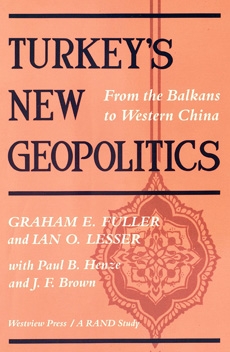| Éditeur : Westview Press | Date & Lieu : 1993, Boulder & Oxford |
| Préface : | Pages : 180 |
| Traduction : | ISBN : 0-8133-8659-4 |
| Langue : Anglais | Format : 145x215 mm |
| Code FIKP : Liv. Ang. | Thème : Politique |
|
Présentation
|
Table des Matières | Introduction | Identité | ||
 Turkey's new geopolitics Graham E. Fuller is a Senior Political Scientist at Rand. He served 20 years as a foreign service officer, including three years in Istanbul, and was the National Intelligence Officer for long-range Middle East forecasting at the CIA. His degrees include a B.A. and an M.A. from Harvard University. Mr. Fuller speaks fluent Turkish and Russian and is finishing a study on modern Turkey as seen through the eyes of its novelists. Among his publications are RAND studies on Islamic fundamentalism in Turkey, Iran, Afghanistan, and Pakistan. He is the author of two books: The "Center of the Universe": The Geopolitics of Iran (Westview, 1991) and The Democracy Trap: Perils of the Post-Cold War World (Dutton, 1992). Ian O. Lesser is a member of the International Policy Department at RAND, specializing in European and Mediterranean affairs. Prior to joining RAND, he was a Senior Fellow in International Security Affairs at the Center for Strategic and International Studies, and has also been a Senior Fellow of the Atlantic Council and a staff consultant at International Energy Associates in Washington D.C. A graduate of the University of Pennsylvania, the London School of Economics, and the Fletcher School of Law and Diplomacy, he received his doctorate from St. Antony's College, Oxford. Dr. Lesser is the author of Resources and Strategy (St. Martin's Press, 1989), as well as numerous publications on the foreign and security policies of southern European countries and the Mediterranean. Paul B. Henze is a long-time Resident Consultant at Rand. He has occupied a considerable variety of senior government positions, including two tours in the American Embassy in Ankara. He was Staff Officer of the National Security Council from 1977 to 1980 with responsibility for several countries, including Turkey. Mr. Henze speaks Turkish, has worked closely with the Institute of Turkish Studies in Washington D.C., and has been a trustee of the American Turkish Foundation for almost a decade. J. F. Brown was a Senior Staff member at RAND between 1989 and 1991. Educated at Manchester University and the University of Michigan, he is a former head of Radio Free Europe (RFE) Research and was Director of Radio Free Europe itself. He has taught at Berkeley and UCLA and has been a visiting research associate at Columbia University and St. Antony's College, Oxford. He is the author of Eastern Europe and Communist Rule and Surge to Freedom: The End of Communist Rule in Eastern Europe, both published by Duke University Press. His latest book is Nationalism, Democracy, and Security in the Balkans (Dartmouth Publishing Company, 1992). At present he is Distinguished Scholar in Residence at the RFE/RL (Radio Liberty) Research Institute in Munich and is working on a study of post-communist Eastern Europe.
| |||||
| Table des Matières | ||||
| ||||